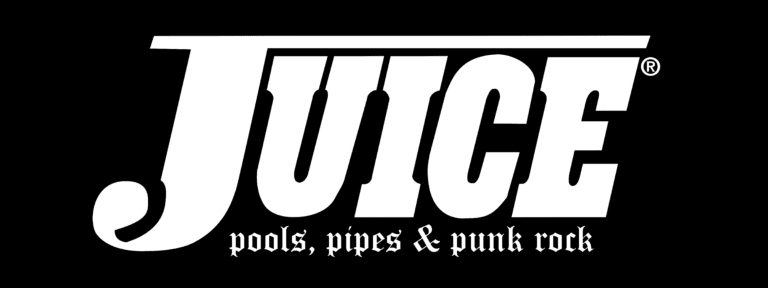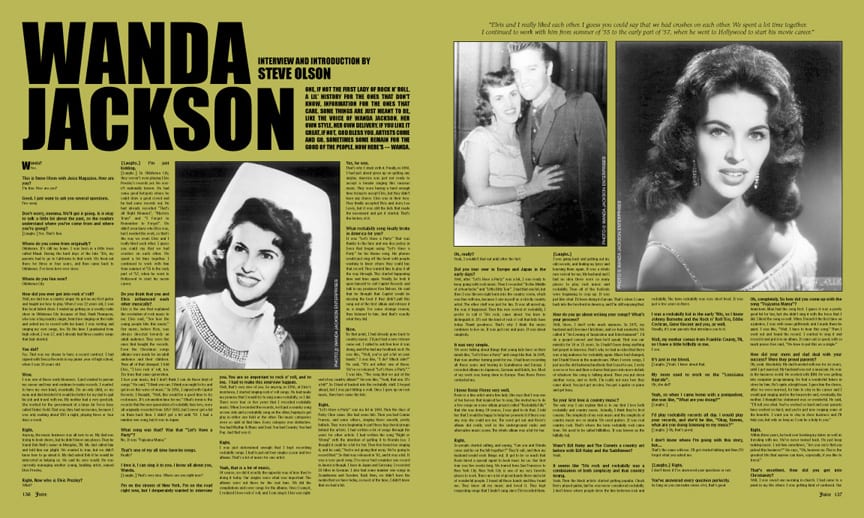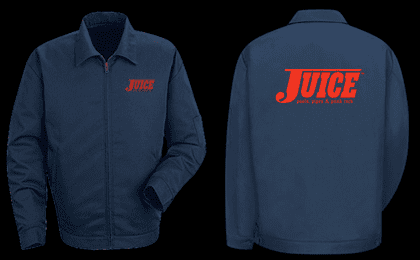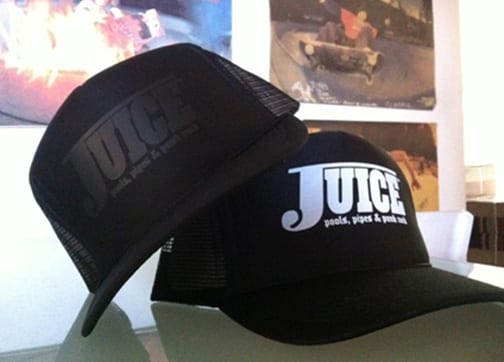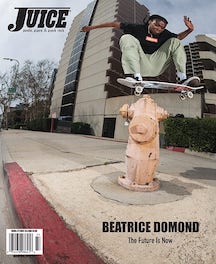INTERVIEW BY STEVE OLSON
INTRODUCTION BY STEVE OLSON
PHOTOS COURTESY OF WANDA JACKSON ENTERPRISES
One, if not the first Lady of Rock n’ Roll. A lil’ history for the ones that don’t know, Information for the ones that care. Some things are just meant to be, Like the voice of Wanda Jackson. her own style, her own delivery. If you like it great, if not, God bless you. Artists come and go, sometimes some remain for the good of the people. now here’s — WANDA.
“ELVIS AND I REALLY LIKED EACH OTHER. I GUESS YOU COULD SAY THAT WE HAD CRUSHES ON EACH OTHER. WE SPENT A LOT OF TIME TOGETHER. I CONTINUED TO WORK WITH HIM FROM SUMMER OF ’55 TO THE EARLY PART OF ’57, WHEN HE WENT TO HOLLYWOOD TO START HIS MOVIE CAREER.”
Wanda?
Yes.
This is Steve Olson with Juice Magazine. How are you?
I’m fine. How are you?
Good. I just want to ask you several questions.
Fire away.
Don’t worry, momma. We’ll get it going. Is it okay to talk a little bit about the past, so the readers understand where you’ve come from and where you’re going?
[Laughs.] Yes. That’s fine.
Where do you come from originally?
Oklahoma. It’s still my home. I was born in a little town called Maud. During the hard days of the late ’30s, my parents had to go to California to find work. We lived out there for three or four years, and then came back to Oklahoma. I’ve been here ever since.
Where do you live now?
Oklahoma City.
How did you ever get into rock n’ roll?
Well, my dad was a country singer. He got me my first guitar and taught me how to play. When I was 12 years old, I won this local talent show. I ended up getting on a weekly radio show in Oklahoma City because of that. Hank Thompson, who was a big country singer, heard me singing on the radio and asked me to record with his band. I was writing and singing my own songs, too. By the time I graduated from high school, I was 17, and I already had three country songs that had charted.
You did?
Yes. That was my dream to have a record contract. I had signed with Decca Records in my junior year of high school, when I was 16 years old.
Wow.
I was one of those early bloomers. I just wanted to pursue my career and tour and continue to make records. I wanted to have my own band, eventually. I’m an only child, so my mom and dad decided if it would be better for my dad to quit his job and travel with me. My mother had a very good job. She worked for the government at a large Air Force base called Tinker Field. That way, they had an income, because I was only making about $50 a night, playing three or four days a week.
Right.
Anyway, the music business was all new to us. My dad was trying to book shows, but he didn’t know any places. Then he found Bob Neil’s name in Memphis, TN. My dad called him and told him our plight. We wanted to tour, but we didn’t know how to go about it. My dad asked Bob if he would be interested in helping us. He said he sure would. He was currently managing another young, budding artist, named Elvis Presley.
Right. Now who is Elvis Presley?
What?
[Laughs.] I’m just kidding.
[Laughs.] In Oklahoma City, they weren’t even playing Elvis Presley’s records yet. He wasn’t nationally known. He had some good hotspots where he could draw a good crowd and he had some records out. He had already recorded ‘That’s All Right Momma’, ‘Mystery Train’ and ‘I Forgot to Remember to Forget’. We didn’t even know who Elvis was, but I needed the work, so that’s the way we went. Elvis and I really liked each other. I guess you could say that we had crushes on each other. We spent a lot time together. I continued to work with him from summer of ’55 to the early part of ’57, when he went to Hollywood to start his movie career.
Do you think that you and Elvis influenced each other musically?
Elvis is the one that explained the revolution of rock music to me. Elvis said, ‘See how the young people like this music.’ Our music, before Elvis, was always directed towards an adult audience. They were the ones that bought the records. Even the Christmas songs albums were made for an adult audience and their children. Then all of that changed. I told Elvis, ‘I love rock n’ roll, too. I’m from that same generation. I love your music, but I don’t think I can do those kind of songs.’ He said, ‘I think you can. I think you ought to try and get in on this wave of music.’ In 1956, I signed with Capitol Records. I thought, ‘Well, this would be a good time to try rock music. It’s a transition time for me.’ What’s ironic is the records that the new generation of rockabilly fans love, were all originally recorded from 1957-1963, but I never got a hit on them back then. I didn’t get a hit until ’59. I had a number one song, but it was in Japan.
What song was that? Was that ‘Let’s Have a Party’?
No. It was ‘Fujiyama Mama.’
That’s one of my all time favorite songs.
Really?
I love it. I can sing it to you. I know all about you, Wanda.
[Laughs.] That’s very nice. Where are you right now?
I’m on the streets of New York. I’m on the road right now, but I desperately wanted to interview you. You are so important to rock n’ roll, and to me. I had to make this interview happen.
Well, that’s very nice of you. So anyway, in 1956, at Elvis’s insistence, I started singing rock n’ roll songs. He had made me promise that I would try to sing some rockabilly, so I did. There were four or five years that I recorded rockabilly music. When I recorded the records, we’d put a country song on one side and a rockabilly song on the other, hoping to get play in either one field or the other. The music categories were so split at that time. Every category was distinctive. You had Rhythm and Blues and Soul. You had Country. You had Pop. And that was it.
Right.
I was just determined enough that I kept recording rockabilly songs. I had to put out four singles a year and two albums. That’s a lot of music for one artist.
Yeah, that is a lot of music.
Of course, we did it exactly the opposite way of how they’re doing it today. Our singles were what was important. The albums were out there for the real fans. We did the compilations and cover songs for the albums. Once I sang it, I realized I love rock n’ roll, and I can sing it. Elvis was right.
Yes, he was.
That’s why I stuck with it. Finally, in 1960, I had just about given up on getting any airplay. America was just not ready to accept a female singing this raucous music. They were having a hard enough time trying to accept Elvis, but they didn’t have any choice. Elvis was in their face. They finally accepted Elvis and Jerry Lee Lewis, but it was still the kids that made the movement and got it started. That’s the history of it.
What rockabilly song finally broke in America for you?
It was ‘Let’s Have a Party.’ That was thanks to the fans and one disc jockey in Iowa that began using ‘Let’s Have a Party’ for his theme song. His phones would just ring off the hook with people wanting to know where they could buy that record. They wanted him to play it all the way through. This started happening time and time again. Finally, he took it upon himself to call Capitol Records and talk to my producer Ken Nelson. He said that he thought that Capitol would be missing the boat if they didn’t pull this song out of the first album and release it as a single. For some strange reason, they listened to him. And that’s exactly what they did.
Nice.
By that point, I had already gone back to country music. I’d just had a new release come out. I called to ask Ken how it was doing, and if he had any feedback on it. He was like, ‘Well, you’ve got a hit on your hands.’ I was like, ‘I do? Which side?’ He said, ‘It’s not either one of those. We’ve re-released ‘Let’s Have a Party’.’ I was like, ‘The song that we put at the end of my country album?’ He was like, ‘Yeah, that one. It’s a hit!’ So I kind of backed into the rockabilly stuff. I forged ahead, but I was just hitting a wall. Once I gave up on rock music, then here came the hits.
Right.
‘Let’s Have a Party’ was my hit in 1960. Then the days of Patsy Cline came. She had some hits. Then you had Connie Francis, and some others, singing these smooth, pretty ballads. They were beginning to put these big choral groups behind the artists. I had written a lot of songs through the years for other artists. I had written the song ‘Right or Wrong’ with the intention of getting it to Brenda Lee. I thought it could be a hit for her. Then Ken heard me singing it, and he said, ‘You’re not giving that away. We’re going to record that.’ So that was released in ’61, and it was a hit. It was a very good song. I’ve never had a number one record in America though. I have in Japan and Germany. I recorded 18 titles in German. I also had some number one songs in Scandinavia and Sweden. Back then, we didn’t have the media that we have today, so most of the time, I didn’t know that we had a hit.
Oh, really?
Yeah, I wouldn’t find out until after the fact.
Did you tour over in Europe and Japan in the early days?
Well, after ‘Let’s Have a Party’ was a hit, I was ready to keep going with rock music. Then I recorded ‘In the Middle of a Heartache’ and ‘Little Bitty Tear’. I had that one hit, but then I was thrown right back into the country scene, which was fine with me, because I saw myself as a strictly country artist. The other stuff was just for fun. It was all mixed up, the way it happened. Then this new revival of rockabilly, I prefer to call it ’50s rock, came about. You have to distinguish it. It’s not the kind of rock n’ roll that kids have today. Thank goodness. That’s why I think the music continues to live on. It was just raw and pure. It was about simplicity.
It was very simple.
We were talking about things that young kids have on their minds like, ‘Let’s Have a Party’ and songs like that. In 1995, that was another turning point for me. I had been recording all these years and touring in Scandinavia and Europe. I recorded albums in Japanese, German and Dutch, too. Most of my work was being done in Europe. Then Rosie Flores contacted me.
I know Rosie Flores very well.
Rosie is a fine artist and a fine lady. She says that I was one of her heroes that inspired her to sing, She invited me to do a few songs on a new album project called ‘Rockabilly Filly’ that she was doing. Of course, I was glad to do that. I told her that I would be happy to help her promote it if there was any way she could use me. The word got out and Rosie’s album did really well in the underground radio and alternative music scene. The whole album was a hit for her.
Right.
So people started calling, and saying, ‘Can you and Wanda come and be on the bill together?’ They’d call, and then my husband would work things out. It got to be so much that Rosie hired a special agent to book tours for us. Our first tour was five weeks long. We toured from San Francisco to New York City. New York City is one of my very favorite places to work. There are a lot of great bands there and a lot of wonderful people. I found all these bands and they found me. They knew all my music and loved it. They kept requesting songs that I hadn’t sang since I’d recorded them.
[Laughs.]
I was going back and getting out my old records, and finding my lyrics and learning them again. It was a whole new revival for me. My husband and I had no idea there were so many places to play rock music and rockabilly. Then all of the festivals were beginning to crop up. It was just like what I’d been doing in Europe. That’s when I came back into the forefront in America, and I’m still enjoying that.
How do you go about writing your songs? What’s your process?
Well, Steve, I don’t write much anymore. In 1971, my husband and I became Christians, and we had a ministry. We called it ‘An Evening of Inspiration and Entertainment’. I’d do a gospel concert and then he’d speak. That was our ministry for 10 or 15 years. So I hadn’t been doing anything but gospel in America. That’s why we had no idea that there was a big audience for rockabilly again. Music had changed, but I hadn’t been in the mainstream. When I wrote songs, I just use the old fashioned methods that I used to use. I write a verse or two and then a chorus that goes into more details of whatever the song is talking about. Then you put down another verse, and so forth. I’m really not sure how they come about. You just get an idea. You get a guitar or piano and get busy.
So your first love is country music?
The only way I can explain that is to say that I love both rockabilly and country music. Actually, I think they’re first cousins. The simplicity of my rock music and the simplicity of country music are so similar. We used guitars. It was real country rock. That’s where the term rockabilly rock came from. We used to be called hillbillies. It was known as the hillbilly fad.
Wasn’t Bill Haley and The Comets a country act before with Bill Haley and the Saddlemen?
Yeah.
It seems like ’50s rock and rockabilly was a combination of both simplicity and that country twang.
Yeah. Then the black artists started getting popular. Chuck Berry played guitar, but he was never considered rockabilly. I don’t know where people drew the line between rock and rockabilly. The term rockabilly was very short lived. It was just a few years in there.
I was a rockabilly kid in the early ’80s, so I knew Johnny Burnette and the Rock n’ Roll Trio, Eddie Cochran, Gene Vincent and you, as well.
Usually, it’s your parents that introduce you to it.
Well, my mother comes from Franklin County, TN, so I have a little hillbilly in me.
I see.
It’s just in my blood.
[Laughs.] Yeah. I know about that.
My mom used to work on the ‘Louisiana Hayride’.
Oh, she did?
Yeah, so when I came home with a pompadour, she was like, ‘What are you doing?’
[Laughs.]
I’d play rockabilly records all day. I would play your records, and she’d be like, ‘Okay, Steven, what are you doing listening to my music?’
[Laughs.] Oh, that’s great.
I don’t know where I’m going with this story, but…
That’s the same with me. I’ll get started talking and then I’ll forget what you asked me.
[Laughs.] Right.
I don’t know if I’ve answered your questions or not.
You’ve answered every question perfectly.
As long as you can make sense of it, that’s good.
Oh, completely. So how did you come up with the song ‘Fujiyama Mama’?
Annisteen Allan had the song first. I guess it was a pretty good hit for her, but she didn’t sing it with the force that I did. I liked the song so well. When I heard it the first time on a jukebox, I was with some girlfriends and I made them be quiet. I was like, ‘Wait. I have to hear this song.’ Then I went out and found the record. I wanted to sing it and record it and put it in an album. It came out so good, with so much power. Ken said, ‘We have to put this on a single.’
How did your mom and dad deal with your success? Were they proud parents?
Oh, yeah. Absolutely. My dad traveled with me for six years, until I got married. My husband was not a musician. He was in the business world. He worked with IBM. He was getting into computer programming. He had a wonderful future in store for him. He’s quite a bright man. I gave him the choice, after we were married, for him to stay in his career and I would quit singing and be the housewife and, eventually, the mother. I thought his statement was so wonderful. He said, ‘I’ll tell you what. You’ve worked so hard and your parents have worked so hard, and you’re just now reaping some of the benefits. I want you to stay in show business and I’ll help you, but only as long as I can be a help to you.’
Right.
Within three years, he took over booking my dates as well as traveling with me. We’ve never looked back. We just keep making music. I ask him sometimes, ‘Are you sorry that you picked this business?’ He says, ‘Oh, heavens no. This is the greatest life that anyone can have, especially, if you like to travel.’
FOR THE REST OF THE STORY, ORDER ISSUE #61 BY CLICKING HERE…
SHARE THIS POST:
- Click to email a link to a friend (Opens in new window)
- Click to share on Tumblr (Opens in new window)
- Click to share on LinkedIn (Opens in new window)
- Click to share on Pinterest (Opens in new window)
- Click to share on Twitter (Opens in new window)
- Click to share on Facebook (Opens in new window)
- Click to share on Reddit (Opens in new window)
- Click to print (Opens in new window)
